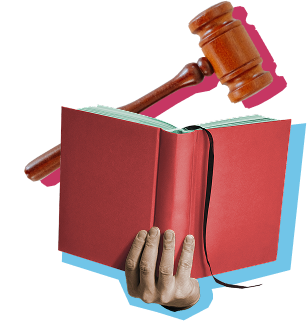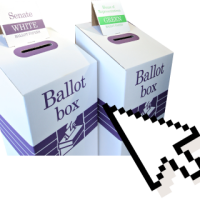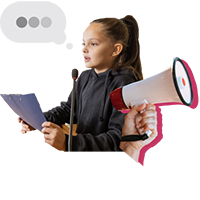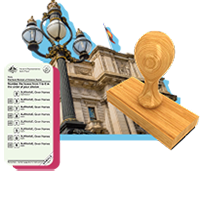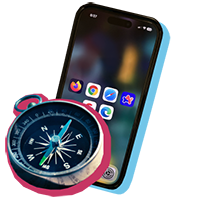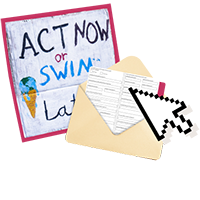
Please note: this page includes topics that some young people
may find distressing, including harassment, discrimination and bullying.
Everyone should be treated equally and fairly no matter who you are.
Knowing your rights and learning how to stand up for yourself can help make sure you are treated fairly and equally at home, work, school and in your community.
2006
is when Victoria became the first state to introduce a human rights charter in Australia
Human rights
What are human rights?
Human rights are based on shared principles of equality, mutual respect and dignity.
They recognise everyone’s value regardless of background, where we live, what we look like, or what we believe.
The Universal Declaration of Human Rights outlines the rights and freedoms to which we’re all entitled. While it does not create legal obligations for countries, it is an important expression of the fundamental values shared across the world.
In Victoria, The Charter of Human Rights and Responsibilities Act 2006 is a law that sets out 20 basic rights of all people in Victoria. New government policies and legislation must observe human rights so that people are treated fairly.
You can learn more about human rights on the Australian Human Rights Commission YouTube channel.
Discrimination
What is discrimination?
Being treated badly or unfairly due to a protected personal characteristic is called discrimination.
Discrimination often happens because of unfair assumptions about people with certain personal characteristics.
In Victoria, we have anti-vilification laws that protects anyone from being discriminated against due to their race, religion, sex, sexual orientation, gender identity or disability. The Victorian Equal Opportunity and Human Rights Commission has more information about protections from discrimination in Victoria.
Bullying and harassment
What is bullying and harassment?
Bullying and harassment occur when someone repeatedly uses words or actions to cause someone else distress. It is not the same as conflict between people (like having a fight or argument) or disliking someone.
Bullying and harassment can include:
- verbal abuse – spoken insults or making mean comments about someone. It also includes telling insulting jokes or making derogatory comments about particular groups.
- physical abuse – being physically harmed or threatened
- written abuse – offensive notes, emails or posts on social media
- sexual harassment – unwelcome sexual behaviour. This can include sending explicit or sexually suggestive messages. It can also include asking intrusive questions about someone’s personal life.
You can learn more about bullying and harassment including what to do if either happens to you on WorkSafe’s website or visit Youth Central for support if you or a friend are experiencing bullying in schools, the workplace, online and more.
Education rights
Everyone has the right to feel safe at in your place of education.
Education providers have a responsibility to make sure their students and staff are treated fairly and with respect.
This means creating a welcoming and equitable learning environment for everyone.
If you feel like you’re not being treated fairly, you may be able to lodge a complaint on your school, university or TAFE portal. It can be helpful to talk to a trusted adult before lodging a complaint.
You can expect that adults that work with you know how to keep you safe. Speaking up is your right and if you don’t feel safe, you can tell a trusted adult and they have to help you.
When you're not being treated fairly, it's important to reach out and seek support. I advocated for the acommodations I needed when I was at school.
Making a complaint to an education provider
- If you are unhappy with how your TAFE or university responds to your complaint, you can escalate it through the Victorian Ombudsman.
- You can escalate government school complaints using the resources on the Make a complaint page.
- You can learn more about raising complaints for non-government schools on the Youth Law Australia page.
By understanding our rights, and the avenues that can help support our rights, we can effectively advocate for ourselves and others.
It's important we stand together, support one another in our shared journey to create a more inclusive community where everyone feels valued, respected, and safe!
Workplace rights
You have the right to a fair, safe and healthy work environment.
Employers have an obligation to identify and reduce hazards and risks to ensure workers’ health and safety.
- Workplace Safety: If you feel unsure or uncomfortable at work, there are places you can go for support. WorkSafe has information specifically for young workers about your rights, responsibilities and support services to help you.
- Youth Workers Centre: If you want to learn more about your work rights or need support in resolving workplace issues.
- Unions: As a worker, you are free to choose whether you join a union. Unions represent the interests of workers within different industries or occupations.
- Unpaid work: Some unpaid work arrangements are lawful and others are not. Depending on the nature of the arrangement, the worker may be an employee and entitled to pay. The Fair Work Ombudsman can help you understand your rights and obligations on the topic of unpaid work. You can contact the Fair Work Infoline on 13 13 94.
- Superannuation: Superannuation is money that employers are legally required to put aside on behalf of their employees. You can’t use the money straight away – it’s saved for when you retire. To learn more about how super works and why it’s important, visit Youth Central.
- Unfair dismissal: Occurs when an employee is forced to leave their job in a harsh or unreasonable manner. If you think you’ve been unfairly dismissed, you can contact the Fair Work Ombudsman.
Learn more about workplace rights on YouthNav.
Rental rights
Living in a house owned by someone else is a big responsibility (you need to look after it!).
But as a renter (commonly known as a tenant) you also have rights. Rental providers (commonly known as a landlord) and real estate agents can’t force you to do certain things. And they can’t kick you out without a good reason.
To find out more about your rights when renting a property and what to do if you are being treated unfairly, head to rental rights on YouthNav.
Where can I go for support?
The Victorian Equal Opportunity and Human Rights Commission role is to protect and promote human rights in Victoria. If you have experienced discrimination, bullying or harassment, you can make a complaint to the commission.
Support for legal issues
Victoria Legal Aid can provide legal information, advice and education. They focus on prevention and early resolution of legal problems.
On Victoria Legal Aid’s website you can search legal information and learn about your options. Victoria Legal Aid also has a series of informative videos. These can help you understand the law and where to go for support for different legal issues.
Contact Victoria Legal Aid to see if they can help with an issue you are facing.
Youth Law Australia provides free and confidential legal advice, assistance and referrals to young people and their advocates. You can contact Youth Law Australia or submit a request for support on their website.
If you want to see someone in person, you can visit the Federation of Community Legal Centres Victoria. They provide free, confidential legal help to people in need and can help you find a community legal centre near you
The Victorian Aboriginal Legal Service
The Victorian Aboriginal Legal Service (VALS) provides referrals, advice, information, or assistance to Aboriginal and Torres Strait Islander peoples. You can contact VALS via their website or call 1800 064 865.
Balit Ngulu is a specialised youth program within VALS. It provides legal assistance and representation to Aboriginal and Torres Strait Islander young people.
Looking after yourself
If something has happened which is impacting your wellbeing, it’s a good idea to talk to a trusted adult.
You can also reach out to these services:
- For crisis support, call Lifeline: 13 11 14 or visit the Lifeline website (24/7).
- For counselling support, call KidsHelpline: 1800 55 1800.
- For support chatting to someone online, on the phone or in-person visit Headspace.
- For counselling support, visit Beyond Blue.
- For support from a peer worker, visit ReachOut.
For Aboriginal and Torres Strait Islander people:
- Call Yarning SafeNStrong on 1800 959 563 or visit the Yarning SafeNStrong website.
- Call 13 Yarn (13 92 76) or visit the 13 Yarn website.
For LGBTIQA+ people:
- Call Rainbow Door on 1800 729 367, text 0480 017 246 (10am-5pm/7 days) or email the Rainbow Door support@rainbowdoor.org.au.
- Visit the LGBTIQA+ switchboard at www.switchboard.org.au.
If you have a disability, you may be able to find a support tailored for your needs by calling the Disability Gateway 1800 643 787.
Remember
- Human rights are based on shared principles of equality, mutual respect and dignity
- Human rights apply to everyone
- You can seek out support in many different ways if you are treated unfairly
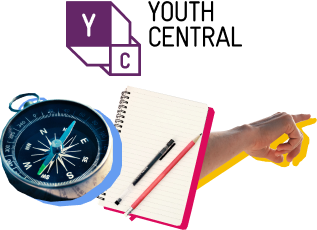
Ready to put your skills into practice?
Get comprehensive guidance on rights and safety at Youth Central.


